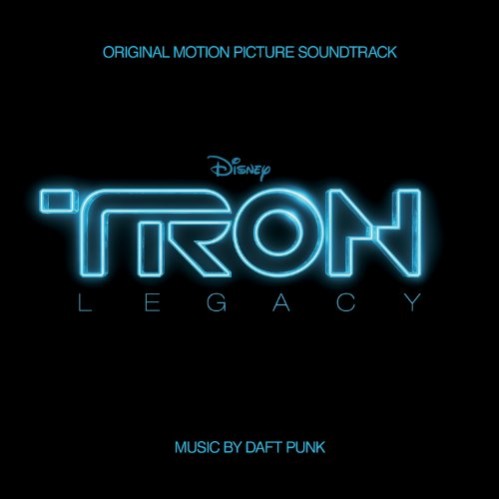Let’s not pay too much attention to the fact that Daft Punk are the artists that have crafted this beautiful blend of electronic and orchestral symphony; this isn’t the sort of album that should be compared to Daft Punk’s discography purely because they are involved in the composition. Instead, it should be viewed as a stand-alone soundtrack to a computerised world. The merits of this album must be judged on how well it embodies the subject matter at hand; in this case, the world of Tron.
The Tron: Legacy OST perfectly captures the mood of the film, although it would still be an enjoyable listen without the cinematic context. These are short electronic interludes, for the most part, that create a deep mood of tension. “Overture” sets the scene; starting the soundtrack slowly with a remorseful and sombre tone, before bursting to life with a series of strings that elevate this music to the wondrous heights that it aspires to. The orchestration is top-notch, mastered beautifully to make each instrument resonate. Flowing perfectly into “The Grid,” complete with an electronic pulse that gathers momentum behind a gruff voice-over, keeps the high-points coming.
Things become more akin to what Daft Punk listeners may be expecting with “The Son of Flynn,” which at less than two minutes long continues the barrage of cyborg electronics. In many respects, the shortness of the songs is the Legacy soundtracks greatest asset; none of these songs out-stay their welcome. There is no temptation to skip a single track, even if some of them begin to sound a little similar. Electronic music can at times be repetitive, and it’s impressive that during this particular soundtrack inspired ideas are given their chance to shine, without going on for an elongated duration.
Although the blending of orchestral and electronic could be a novelty, it works extremely well throughout the soundtrack. “Rinzler” literally has the strings completing the electronic loops as part of the melody, gradually growing in sound and significance, threatening to dominate the synthesisers but contained just enough as to not be overpowering. The Disney influence is in many ways equally as apparent throughout as the involvement of Daft Punk, with grand and impressive melodies that inspire: the latter string arrangement in “Outlands” perhaps embodies this best. “Rectifier” sounds positively villainous with its screeching arrangement, and the soundtrack in general certainly adopts a more aggressive tone in its latter parts.
Really, the only slightly odd thing is that the album seems more swayed towards orchestration than electronics. Daft Punk are famous in the electronic world, and yet their involvement in some songs seems questionable: “Flynn Lives” is one example of a purely orchestral song that seems to lack any form of electronics at all. This isn’t necessarily a bad thing; it would have been so easy for Daft Punk to dominate this soundtrack. Instead, the duo merely compliment the already expert composing knowledge of Disney. There’s never a long time where the listener is left wondering if Daft Punk are present; every few songs clearly feature the duo, and the ending credits especially deserve a mention as one of the more electronic songs. This isn’t just a good soundtrack; it’s a good demonstration that Daft Punk are able to lend their name to a project that might have come as a surprise to some of their many fans. After listening to Legacy it seems difficult to imagine anyone else achieving what they have whilst working with Disney studios.

